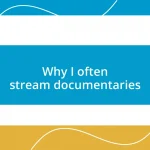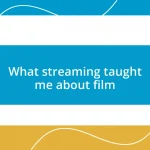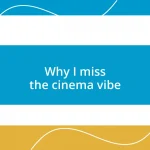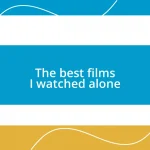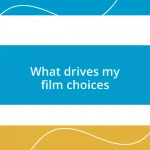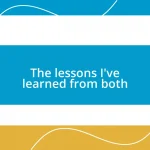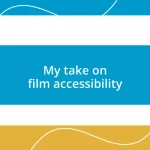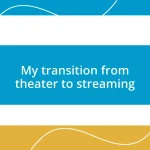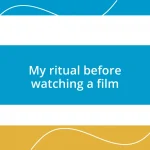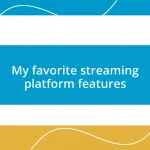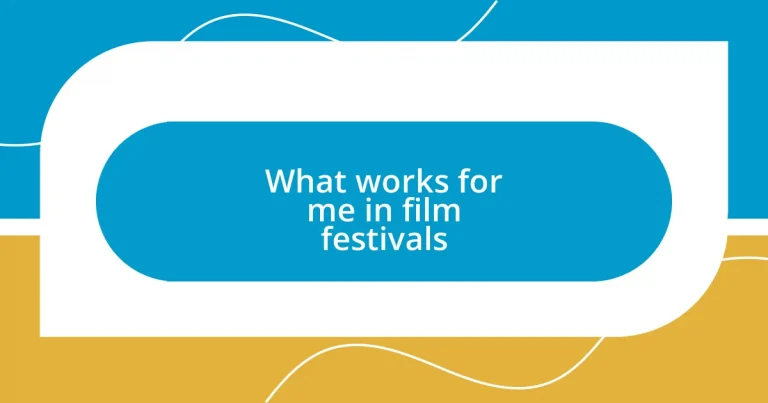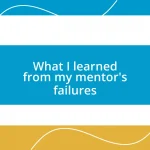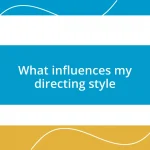Key takeaways:
- Film festivals are vital for showcasing work, forming connections, and engaging in meaningful discussions about cinema and social issues.
- Proper research and preparation for festival submissions, including aligning with festival goals and ensuring compliance with technical requirements, can significantly enhance a filmmaker’s chances of success.
- Active audience engagement and networking during festivals foster valuable connections and feedback that contribute to personal and professional growth as a filmmaker.
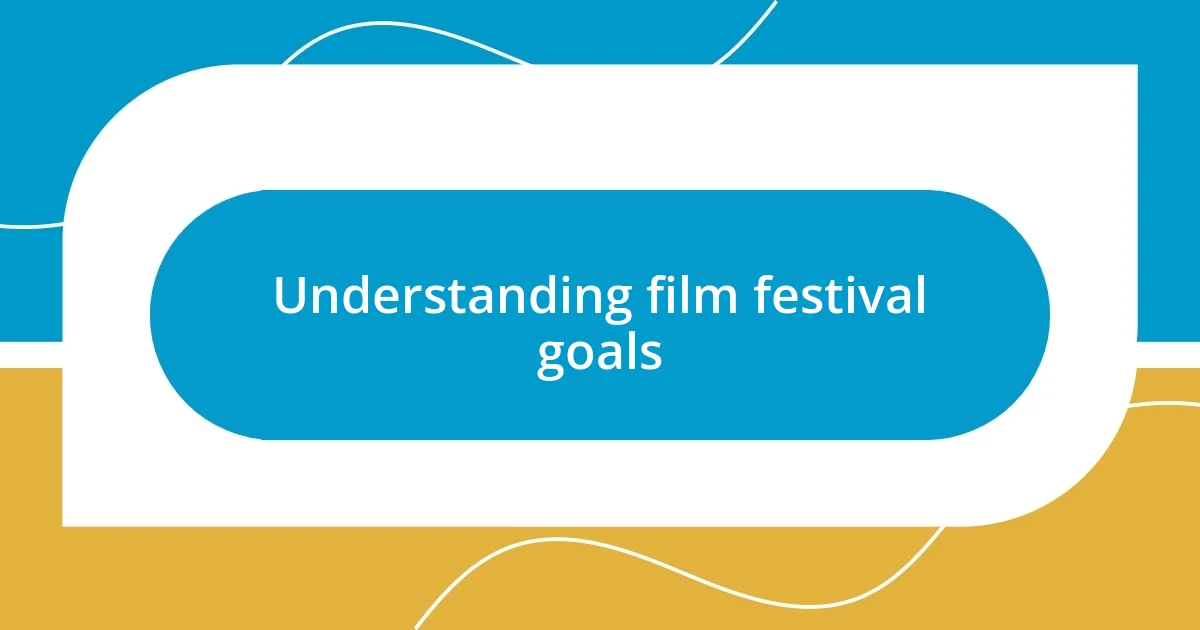
Understanding film festival goals
Film festivals serve a multitude of purposes, one of which is to provide a platform for filmmakers to showcase their work. I still remember the first time I attended a festival with my own short film; the sheer excitement of standing before a crowd and sharing my vision was exhilarating. It made me realize that beyond the accolades, the heart of a festival lies in creating connections and celebrating storytelling.
Understanding the specific goals of a film festival can deeply enhance your experience. For instance, some festivals prioritize emerging talent, while others focus on niche genres or themes. Reflecting on my journeys, I’ve encountered festivals that champion social issues, drawing attention to voices that often go unheard, which always leaves me pondering—how can my own work contribute to this dialogue?
Ultimately, the goals of a film festival can also shape how an audience interacts with the films presented. I find that watching a film in a festival setting, surrounded by passionate cinephiles, elevates the viewing experience. Engaging with others about the themes and messages can turn a simple screening into a profound conversation, making us ponder—what does cinema mean in our current world?
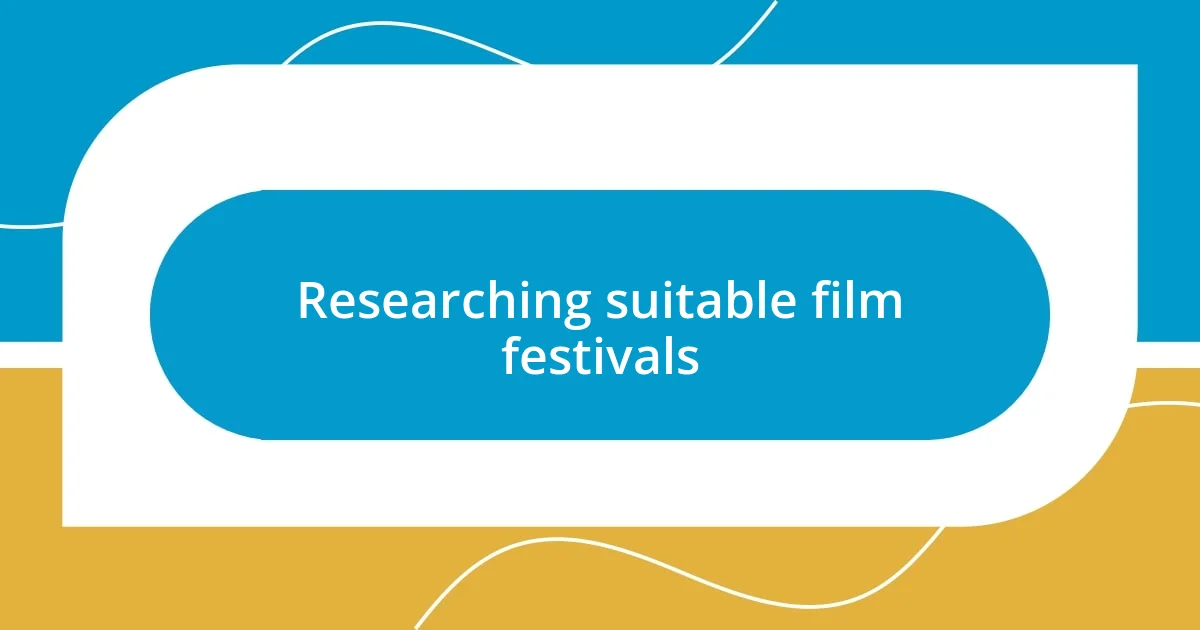
Researching suitable film festivals
Researching suitable film festivals can feel overwhelming, but I find that a structured approach makes it manageable. Start by identifying festivals that align with your film’s theme or genre. For example, I once had the opportunity to enter a festival dedicated solely to environmental issues, which really resonated with the core message of my film. This specificity not only ensured my film was shown to the right audience but also deepened my engagement with the festival’s mission.
I’ve learned that the submission process gives valuable insights into what a festival values. If the festival emphasizes diversity and inclusion in its mission statement, consider how your project fits into that narrative. Reflecting on some of my past submissions, I realized that festivals that champion underrepresented voices often provide a more enriching experience both for filmmakers and audiences, prompting thought-provoking discussions about representation in cinema.
Finally, tapping into filmmaker communities and online forums can be incredibly beneficial while researching. Sharing experiences with fellow creators has immensely broadened my perspective. I remember a late-night discussion with a group of filmmakers where insights about different festivals transformed my approach towards submissions, nudging me to consider festivals I hadn’t previously thought of. The camaraderie and support in these communities remind me that we’re all navigating this intricate landscape together.
| Festival Type | Focus |
|---|---|
| Local Festivals | Showcasing regional talent |
| Niche Festivals | Specific themes or genres |
| International Festivals | Global cinema, major showcases |
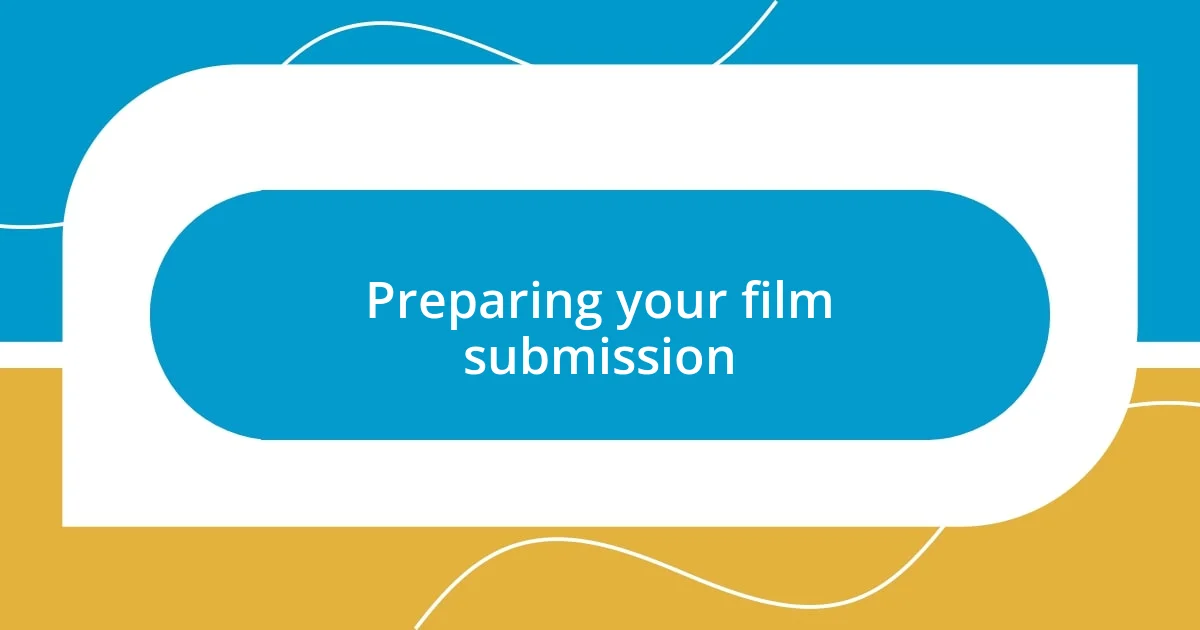
Preparing your film submission
Preparing your film submission can stir up a mix of excitement and nervousness. I remember painstakingly editing the film before just hitting that “submit” button. It’s crucial to ensure that every aspect — from your film’s runtime to its technical specifications — is aligned with the festival’s guidelines. Attention to detail here can be the difference between acceptance and rejection, as I discovered after one disappointing experience with a festival that strictly enforced its rules.
Here are some key elements to consider when preparing your submission:
- Film Format: Make sure you’re submitting the required file format, whether it’s online streaming or a physical copy.
- Runtime: Confirm the film length fits within the festival’s specified limits.
- Accompanying Materials: Include necessary documents, such as a synopsis, director’s statement, and cast/crew lists.
- Quality Check: Always screen your film on multiple devices to catch any inconsistencies in sound or picture quality.
- Cover Letter: Personalize your cover letter to reflect your connection to the festival’s mission and why your film is a good fit.
Being methodical about your submission not only eases the process, but it also helps channel your nervous energy into something productive. I still recall the feeling of relief and pride when I finally submitted my film to a festival that felt just right. That experience reinforced a vital lesson I’ve carried with me: preparation is key, but so is finding joy in sharing your art with others.
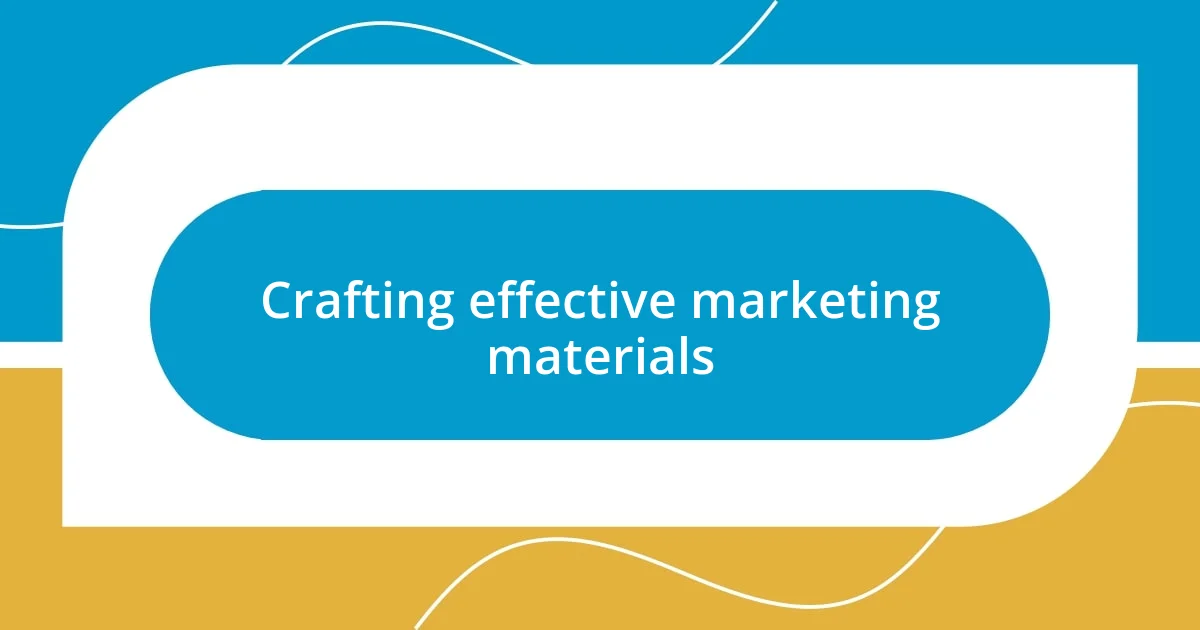
Crafting effective marketing materials
Crafting effective marketing materials is one of those tasks that can either make or break your festival experience. I recall a festival season where I designed a vibrant poster filled with imagery reflecting the emotional core of my film. The reactions were incredible — people were genuinely drawn in, wanting to know more. It struck me then how a compelling visual narrative can evoke curiosity and set the tone before anyone even sees the film.
When it comes to written content, clarity and passion are your best friends. I vividly remember pouring my heart into a director’s statement, ensuring it conveyed not just what the film was about, but also why I felt compelled to tell that story. This personal touch can resonate with festival staff; I often wonder if my enthusiasm made a difference in how they connected with my work. Remember, it’s not just about promoting your film; it’s about sharing a part of yourself that invites others to join in your journey.
Don’t underestimate the power of digital marketing materials, either. During one year, I created a short teaser video, highlighting the film’s most memorable scenes. Sharing that on social media connected me with audiences before the festival even started. It made me realize that marketing isn’t just about the festival; it’s about cultivating a community around your film. Have you thought about how your materials could engage potential viewers even before the curtains rise?
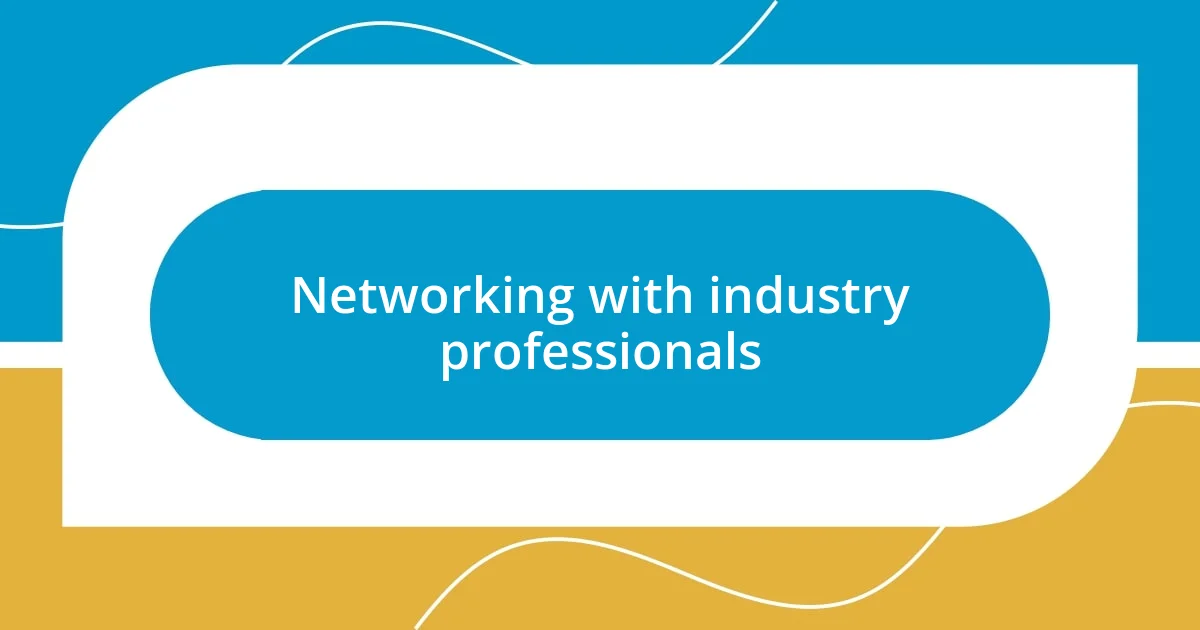
Networking with industry professionals
Networking with industry professionals at film festivals is truly one of the most enriching experiences I’ve had. I remember standing by the refreshment table feeling a bit like a wallflower, but that changed when I struck up a conversation with a fellow filmmaker. It turned out he was also looking for collaborators, and by the end of that chat, we had exchanged contact information and ideas for a potential project. Isn’t it amazing how a simple conversation can open the door to new opportunities?
It’s also crucial to be prepared with a quick pitch about your film. I had an eye-opening experience when I met a producer in a casual setting, and my ability to clearly describe my project sparked genuine interest. I think about how easy it was to get their attention when I focused on the unique elements of my story. Have you ever felt overwhelmed in such moments? Just remember, confidence can make all the difference, even when your heart races.
Lastly, I’ve learned to follow up after these interactions, which has been a game-changer. After one festival, I sent a personal email thanking a distribution expert for their insights. This simple gesture didn’t just leave a positive impression; it led to future conversations that have shaped my approach to distribution. Isn’t it comforting to know that a few well-placed words can grow into lasting professional relationships?
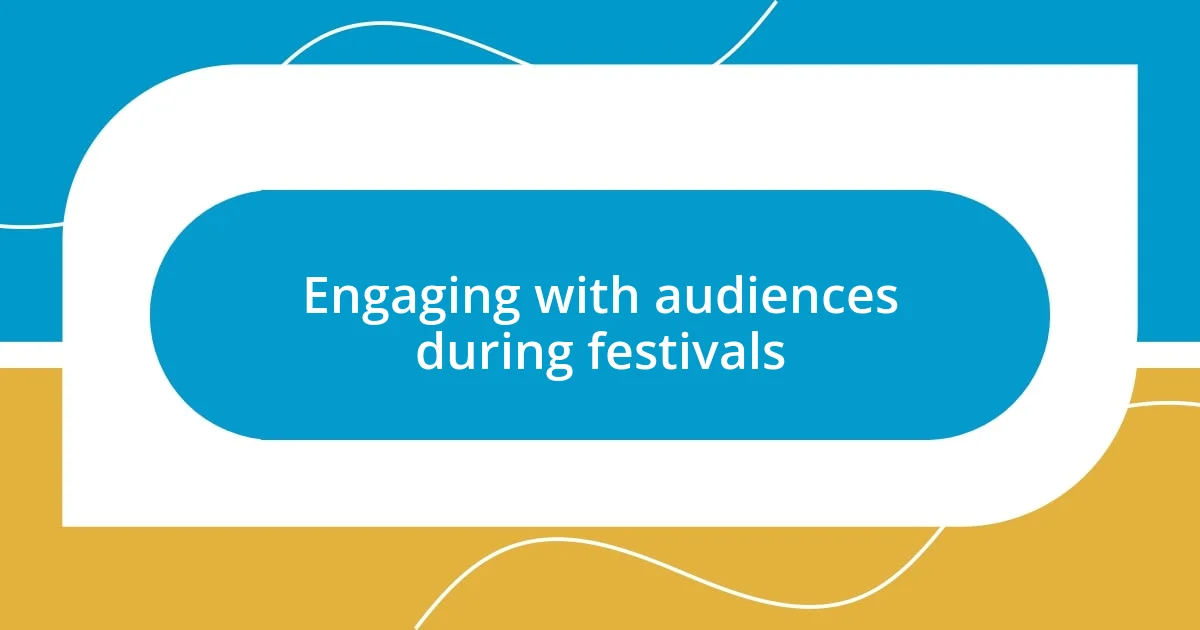
Engaging with audiences during festivals
Engaging with audiences during festivals is a vital part of the experience, and I’ve found it can be surprisingly rewarding when approached with intention. At one festival, I set up a small booth where I displayed behind-the-scenes photos and shared stories from the filming process. The genuine interest I saw from attendees was heartwarming. When people connected to those personal stories, it felt like we were all crowding around a campfire, sharing laughs and moments — isn’t that what storytelling is all about?
I’ve often tried to create interactive experiences too. For instance, during a Q&A session after one of my screenings, I invited the audience to ask questions but also to share their own stories related to the film’s themes. It was exhilarating to see how many participants resonated with elements of vulnerability or love within the story. Engaging them this way not only made them feel valued but also enriched the conversation, transforming it from a one-sided dialogue into a vibrant exchange of thoughts. Have you ever thought about how such interactions might deepen your audience’s connection to your film?
Social media is another fantastic tool for engaging audiences before, during, and even after festivals. I remember live-tweeting during one of my premieres, sharing snippets of excitement and behind-the-scenes details as they unfolded. The instant feedback and reactions from viewers were incredible! Many expressed their eager anticipation while others shared their thoughts in real-time, creating a shared experience that went beyond the confines of the theater. Have you explored how a digital dialogue could amplify your festival experience? It’s a game-changer!
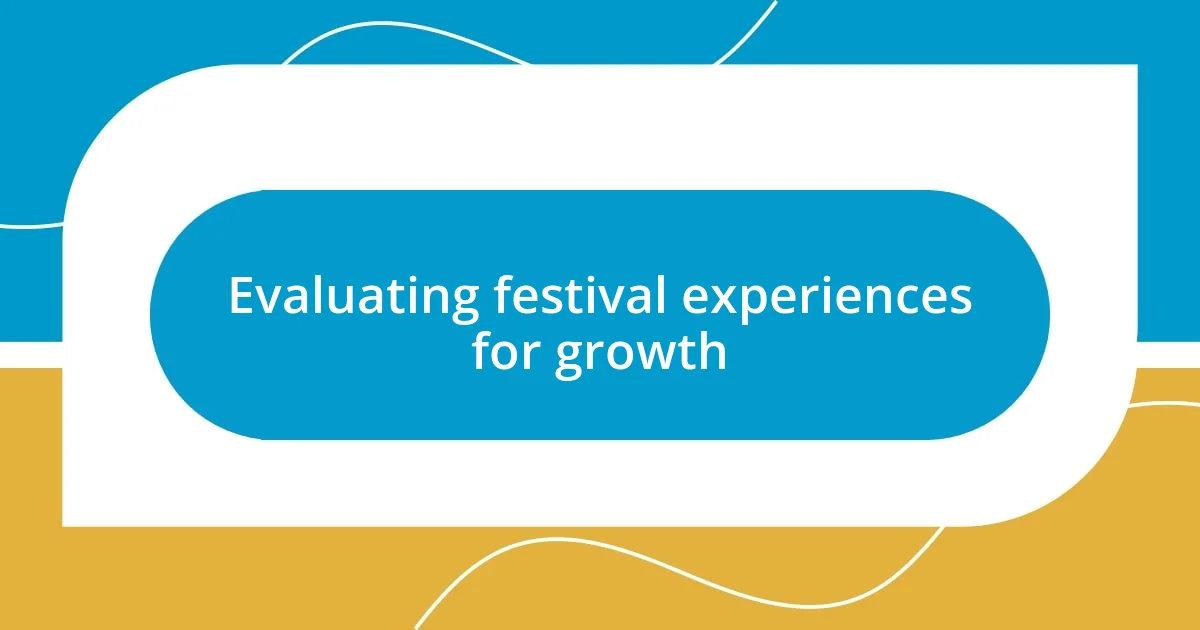
Evaluating festival experiences for growth
Evaluating festival experiences for growth involves reflecting on both what went well and what could be improved. I recall a festival where I received feedback after my screening that left me questioning my film’s message. It was tough to hear, but I took a step back to analyze the comments. Rather than brushing them off, I utilized that critique to reassess my storytelling approach, ultimately leading to a more impactful project. Have you ever found growth in moments of discomfort?
I also believe that documenting festival experiences is crucial. After attending one particularly enlightening festival, I made it a habit to jot down key learnings and interactions in a journal. This exercise allowed me to revisit my thoughts and track my evolution as a filmmaker over time. Reflecting on those notes often ignites new ideas and motivates me to tackle upcoming projects with a fresh perspective. Isn’t it incredible how written reflection can spark your creativity?
Moreover, sharing experiences with fellow filmmakers can provide unexpected insights. During a post-screening discussion, a colleague shared their struggle with pacing in their film, which resonated with my own challenges. By collaborating on strategies and solutions, we both walked away with actionable takeaways. It reminded me of the power of community in personal growth—have you considered how much you could learn from discussing experiences with others?
